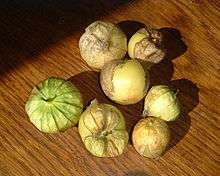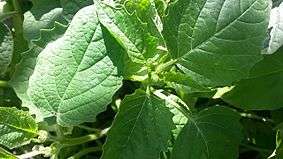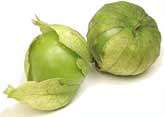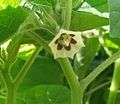Tomatillo
| Tomatillo | |
|---|---|
 | |
| Fresh harvest of tomatillos | |
| Scientific classification | |
| Kingdom: | Plantae |
| (unranked): | Angiosperms |
| (unranked): | Eudicots |
| (unranked): | Asterids |
| Order: | Solanales |
| Family: | Solanaceae |
| Genus: | Physalis |
| Species: | P. philadelphica |
| Binomial name | |
| Physalis philadelphica Lam. (1786) | |
| Synonyms | |
|
Physalis ixocarpa Brot. | |

The tomatillo (Physalis philadelphica), also known as the Mexican husk tomato, is a plant of the nightshade family bearing small, spherical and green or green-purple fruit of the same name.
Tomatillos originated in Mexico and were cultivated in the pre-Columbian era.[1] A staple of Mexican cuisine, they are eaten raw or cooked in a variety of dishes, particularly salsa verde.
History
Tomatillos were domesticated in Mexico before the coming of Europeans, and played an important part in the culture of the Maya and the Aztecs, more important than the tomato.[2] The specific name philadelphica dates from the 18th century.[2]
Distribution
Tomatillos are native to Central America and the south-western region of North America. In Mexico, the plant is grown mostly in the states of Hidalgo and Morelos; it is also grown in the highlands of Guatemala where it is known as "miltomate".
The plant has been exported around the world. In the 1950s, it was exported to India, where it was cultivated in Rajasthan; it is grown and processed also in Queensland (Australia), Polokwane (South Africa), and Kenya. In the United States, tomatillos are grown in California and Iowa, where scientists from Iowa State University promoted a strain of tomatillos for Midwestern farmers they dubbed "jamberry".[2] In 1952, another strain was introduced in Ohio, under the name "jumbo husk tomato".[3]
Uses
Tomatillos are a key ingredient in fresh and cooked Mexican and Central-American green sauces. The green color and tart flavor are the main culinary contributions of the fruit. Purple and red-ripening cultivars often have a slight sweetness, unlike the green- and yellow-ripening cultivars, and are therefore generally used in jams and preserves. Like their close relatives, cape gooseberries, tomatillos have a high pectin content. Another characteristic is they tend to have a varying degree of a sappy sticky coating, mostly when used on the green side out of the husk.
Ripe tomatillos keep refrigerated for about two weeks. They keep even longer with the husks removed and the fruit refrigerated in sealed plastic bags.[4] They may also be frozen whole or sliced.
Plant Description
Plants are typically about one meter in height, and can either be compact and upright or prostrate with a wider, less dense canopy. The leaves are typically serrated and can either be smooth or pubescent.

Flower Description
Flowers come in several colors including white, light green, bright yellow, and sometimes purple. Flowers may or may not have purple spots toward the center of the corolla. The anthers are typically dark purple to pale blue. Tomatillo plants are highly self-incompatible, and two or more plants are needed for proper pollination. Thus, isolated tomatillo plants rarely set fruit.[5]
Fruit Description
The tomatillo fruit is surrounded by an inedible, paper-like husk formed from the calyx. As the fruit matures, it fills the husk and can split it open by harvest. The husk turns brown, and the fruit can be several colors when ripe, including yellow, green, or even purple. The freshness and greenness of the husk are quality criteria.
Flower types:
Varieties
There are several varieties of tomatillos, with a variety of tastes and traits. (They ripen to be the following colors: green, yellow, and purple.) The Pineapple tomatillo, for instance, is yellow and has hints of pineapple flavor;[6] Rio Grande Verde is very large, and green, by comparison. Like tomatoes, tomatillos may be either indeterminate or determinate,[7][8] although they are sometimes thought to be generally indeterminate.[9] Here is a list of tomatillo varieties:
- Amarylla[10]
- Cisineros[11]
- Everona Large Green[12]
- Gigante[13]
- Green Husk[14]
- Mexican Strain[15]
- Mt Pima[16]
- Pineapple[6]
- Purple[17]
- Purple Coban[18]
- Purple De Milpa[19]
- Rio Grande Verde[7]
- Tiny from Coban[20]
- Toma Verde[21]
- Verde[22]
- Yellow[23]
Names

The tomatillo (from Nahuatl, tomatl[2]) is also known as husk tomato,[24] Mexican groundcherry,[25] large-flowered tomatillo,[26] or Mexican husk tomato. Some of these names, however, can also refer to other species in the Physalis genus.[2] Other names are Mexican green tomato and miltomate. In Spanish, it is called tomate de cáscara, tomate de fresadilla, tomate milpero, tomate verde (green tomato), tomatillo (Mexico; this term means "little tomato" elsewhere), miltomate (Mexico, Guatemala), or simply tomate (in which case the tomato is called jitomate). Tomatillos are sometimes called "green tomatoes"; unripe tomatoes may go by the same name, though the fruit is in a different genus.
See also
References
- ↑ Plata, Edith Metcalfe de (1984). Mexican Vegetarian Cooking. Inner Traditions/Bear. p. 17. ISBN 9780892813414.
- 1 2 3 4 5 Small, Ernest (2011). Top 100 Exotic Food Plants. CRC Press. pp. 117–20. ISBN 9781439856888.
- ↑ Morton, Julia F. (1987). "Mexican Husk Tomato". Fruits of Warm Climates. Winterville: Creative Resource Systems. pp. 434–37. ISBN 0-9610184-1-0.
- ↑ Carter, Noelle; Deane, Donna (14 May 2008). "Tomatillo: a green sourpuss with a sweet side". Los Angeles Times. Retrieved 3 August 2009.
- ↑ Vernonica E. Franklin-Tong, ed. (2008). Self-Incompatibility in Flowering Plants: Evolution, Diversity and Mechanisms. Springer. ISBN 978-3-540-68485-5.
- 1 2 http://www.reimerseeds.com/pineapple-tomatillo.aspx
- 1 2 http://www.rareseeds.com/rio-grande-verde-tomatillo/
- ↑ https://www.totallytomato.com/dp.asp?pID=00870&c=129&p=Toma+Verde+Tomatillo
- ↑ http://extension.oregonstate.edu/gardening/grow-tomatillos-green-salsa-salsa-verde
- ↑ http://www.rareseeds.com/amarylla-tomatillo/
- ↑ http://www.tradewindsfruit.com/physalis-ixocarpa-cisineros-tomatillo-seeds
- ↑ http://www.reimerseeds.com/everona-large-green-tomatillo.aspx
- ↑ http://www.reimerseeds.com/gigante-tomatillo.aspx
- ↑ http://www.reimerseeds.com/green-husk-tomatillo.aspx
- ↑ http://www.territorialseed.com/product/Mexican_Strain_Organic_Tomatillo_Seed/tomatillo_and_ground_cherry_seed
- ↑ http://www.reimerseeds.com/mt-pima-tomatillo-10.aspx
- ↑ http://www.highmowingseeds.com/organic-non-gmo-seeds-purple-tomatillo.html
- ↑ http://www.rareseeds.com/purple-coban-tomatillo/
- ↑ http://www.redwoodseeds.net/products/purple-de-milpa-tomatillo
- ↑ http://www.rareseeds.com/tiny-from-coban-tomatillo/
- ↑ http://www.johnnyseeds.com/p-7925-toma-verde.aspx
- ↑ http://www.rareseeds.com/tomatillo-verde/
- ↑ http://www.tradewindsfruit.com/physalis-ixocarpa-yellow-tomatillo-seeds
- ↑ Valladolid, Marcela (2010). Fresh Mexico: 100 Simple Recipes for True Mexican Flavor. Potter/TenSpeed/Harmony. p. 249. ISBN 9780307885531.
- ↑ "Physalis philadelphica". Natural Resources Conservation Service PLANTS Database. USDA. Retrieved 31 January 2016.
- ↑ "BSBI List 2007". Botanical Society of Britain and Ireland. Archived from the original (xls) on 2015-02-25. Retrieved 2014-10-17.
External links
| Wikimedia Commons has media related to Physalis philadelphica. |




